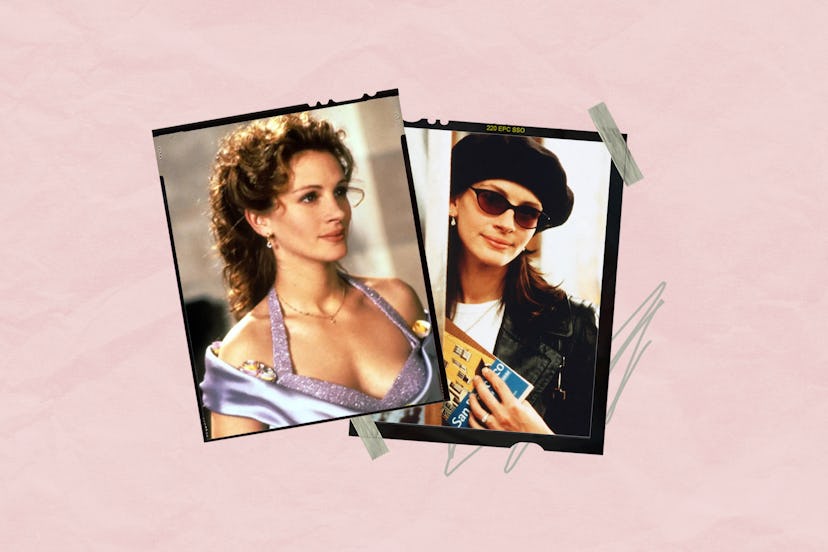TV & Movies
What I Learned From Julia Roberts’ Favorite Julia Roberts Rom-Coms
There’s a trend that seems to be continuing with Ticket to Paradise, too.

In the newly released movie Ticket to Paradise, Julia Roberts and George Clooney play a divorced couple who team up to stop their daughter’s hastily planned wedding. If the premise sounds amusing to you, you’re not alone — the script was good enough to pull Roberts out of a two-decade romantic comedy hiatus. That’s right: Not since Notting Hill hit theaters in 1999 has Roberts starred in a good, old-fashioned rom-com.
According to Roberts, there’s a simple reason why — and it’s not because she’s fallen out of love with the genre. “People sometimes misconstrue the amount of time that’s gone by that I haven’t done a romantic comedy as my not wanting to do one,” Roberts told The New York Times in April. “If I had read something that I thought was that Notting Hill level of writing or My Best Friend’s Wedding level of madcap fun, I would do it. They didn’t exist until [Paradise].”
And she has a point! There are definitely some modern rom-com gems, but largely, it feels like the golden era of rom-com classics is behind us — or at least, has taken a break. Clearly, it’s a time we’re still nostalgic for; as Scott Meslow recently wrote for Bustle, 2022 alone has seen three former rom-com queens in Sandra Bullock, Jennifer Lopez, and now Roberts, return to genre after a long break.
But what is it, exactly, that’s been missing? What did the likes of Notting Hill and My Best Friend’s Wedding get so right? The leads from Julia Roberts’ favorite Julia Roberts rom-coms do have something in common: they’re a bit twisted. And not just in the “adorably eccentric” or “unlucky in love” way like, say, Jenna Rink or Elle Woods (icons in their own right, to be fair).
In My Best Friend’s Wedding, Roberts plays Jules Potter, a food critic who realizes she has feelings for her best friend, Michael, right before he gets married. As the couple’s maid of honor, Jules does everything she can to stop the wedding from the inside: humiliating and trying to frame the bride-to-be for getting Michael fired, gaslighting the groom, and — perhaps most egregiously — kissing him on his wedding day.
For her part, Notting Hill’s Anna Scott — a famous, deeply unhappy actor — is more self-destructive than anything, but she also puts her man through the rom-com wringer. At first, Anna dates Will while she has a boyfriend — without letting Will know he’s the other man. Later, she lashes out at him because she thinks he tipped off the paparazzi... and it’s only when Will reaches out nearly a year later that they even talk again. Anna only lets herself be vulnerable in her final monologue to Will: “I’m also just a girl, standing in front of a boy, asking him to love her.”
That moment, and Roberts’ ill-advised love confession to Michael in My Best Friend’s Wedding, land for the same reason. Her characters are thorny, and rather than clashing with the rom-com trappings — the meet-cutes, the love professions, the quirky best friends along for the ride — they heighten them. It seems to be a space Roberts likes to live in. As My Best Friend’s Wedding director P.J. Hogan put it to Meslow in his book From Hollywood with Love, “Julia was absolutely committed to Julianne’s dark side ... so committed to the dark side that I was a little bit worried.” Despite his concerns, Hogan praised Roberts for infusing her performance with a little bite. “She wanted to mess with her image. She really wanted to. She just believed that somebody in love is capable of doing terrible things.” Paradise only strengthens that credo — if Roberts’ characters do bad things in pursuit of romantic love, how far might they go for the maternal kind? Surely, plotting to ruin her child’s wedding is one of Roberts’ biggest rom-com crimes.
Not every good rom-com lead needs to be an expert self-saboteur (though if you need one, call Roberts). What Notting Hill and My Best Friend’s Wedding really teach us is what the genre can do when its characters are granted the space to be real, fully considered people. That doesn’t mean subverting the genre’s fun, feel-good elements — Roberts’ favorite films are trope-y as anything! — but there’s room for nerve in the fantasy, too.